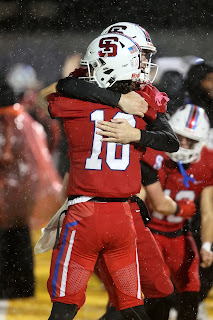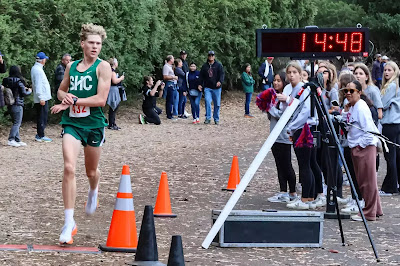I don't have high blood pressure. 93 over 60 is on the low side. That being said, I am certain that my numbers were far different on Saturday, November 30, 2024 when I saw Notre Dame defeat USC 49-35 at the Los Angeles Memorial Coliseum. Attending this historic rivalry game is both a blessing and an agonizing experience. I find myself confronting interesting questions, important ones. Am I glutton for pain? Is it worth it? Why do I care? The purpose of this post is to offer but a few insights to which all sports fan can relate both in the positive and the negative. And the next time I see you, I hope you will add, amend and acknowledge some truth in it all.
It's personal.
I won't apologize. I can't. I hate USC. I didn't go to Cal or to UCLA. I'm a Notre Dame grad. We share this sentiment. The reasons for our shared disdain are abundant, but I'm supposed to take some high road (so I've been told) so I'll keep it brief.
To a large degree, I have inherited these strong sentiments. My Dad and my uncle can't stand the Trojans. It's not for the infamous moniker "University of Spoiled Children" as much as it is for the number of National Championships they have cost ND. To their credit, they have great athletes who manifest their two word slogan: Fight On.
However, I don't like their athletes, their ethos or the way that they play. Chippy is one way to describe it. Furthermore, I do not appreciate that their fans boo the visiting team upon entering and exiting the field (at the start of the game, at the half, etc). That is unsportsmanlike conduct. Their is no penalty, except for the fact it speaks volumes about their character. I don't know what I would do if my team did that as a regular practice; it is not okay.
I know many alumni who are loud and proud of their school; I get that. Notre Dame alums are no different....but we are.

Quite the Headache
Unfortunately, I arrived on campus with a headache. No, I was not hungover. Despite taking three Advil, the discomfort did not subside. I found it symbolic. The USC marching band was directly across the stadium from where we were sitting. At times, I could hear my head pounding to the relentless beat of that drum.
Their fight song is incessant. It seems to pause for but a few announcements and media spotlights. The Coliseum does play popular hype songs, but these are even interrupted for the band to play "Fight on." It's not hard to imagine the men of Troy going to war with that soundtrack in the background. I have always wondered if students and alumni appreciate it. Trojans: weigh in, please!
Number 13
Regular readers of this blog know that I am not a Caleb Williams fan. In fact, I actively root against him in the NFL for a multitude of reasons—again, which I have blogged about before. I could hardly believe my eyes when I saw his return on the field for the retirement of his jersey. A transfer from Oklahoma, Williams played but two years for the Trojans. He won a Heisman. during his first year with the team and early on in his second year was supposed to win it again. Jayden Daniels took the prize.
Yes, he was the number one pick in the 2023 NFL draft. He holds a number of personal records and as written on the USC Trojans football website he "was instrumental in successfully turning around a program that went 4-8 in the 2021 season to an 11-3 team in 2022." But in his second season, the Trojans underperformed; they finished 8 and 5. There is room to celebrate individual achievements and success, but last time I checked football is a team sport. Some call it the ultimate team sport. I question the decision to retire his jersey this soon. You might not agree...it's certainly up for debate.

I ask this question because as written on NFL Football Operations page, "The NFL uses the fine schedule to outline the league’s and the union’s expectations for players to conduct themselves in a way that honors the sport and respects the game, themselves, their fellow players, the fans and the league. The rules are intended to protect the players from unnecessary risk, promote player safety and emphasize sportsmanship and respect of teammates, opponents, coaches, officials and fans." I find the entire system and pay structure fascinating. Check it out.
Actions have consequences and given what is at stake, I'm not convinced a financial penalty isn't worth further consideration. The fighting between OSU and Michigan this past weekend brings this into a new light. Still, if you find my question ridiculous or inappropriate, I understand. On some level it is and yet, the sheer amount of money swimming/driving/fueling the ecosystem of college football is too.
Notable Change
NIL hasn't just changed the face of college sports for just the athletes, but it has shifted the apparel of the fans as well. In the past, all jerseys included but the school name and number. On Saturday, I couldn't help but take inventory of who wore what. Notable examples include:
#5 Te'0, #7 Estime, #9 Zibikowski, and of course #10 Hartman.
It's nearly antithetical to Irish football to have names on the jersey (minus the Shamrock Series and the Bowl game) but they are for sale! I don't have strong opinions against them, it's just a trend in this new era. But so are the all white uniforms ND wore. To quote my friend, Andy "I don't hate the uniforms." How I love a good double negative.
 |
Both Pick-Sixes happened right in front of our eyes.
This was taken after Xavier Watts ran the ball 99 yards for a TD securing the W |
Accentuate the PositiveIn spite of the agony, the ecstasy came in the form of not one but two pick-sixes late in the game leading the Irish to victory. Winning in enemy territory is never easy, especially at the Coliseum. It is always something to celebrate. Yes, we were hyped. See photo above.Furthermore, a football game in Southern California in late November? Not too bad. It was sunny and 75 with a beautiful skyline. I loved the time with friends—making new memories— and interacting with other fans.
USC knows pageantry. Yes, I will complain about the band, but their uniforms, Trigger, and some of the on field recognitions are very impressive. For example, they acknowledged two USC grads who are members of the World Series Championship team, the LA Dodgers. Congratulations to Kyle Hurt and Mark Prior. Totally makes sense that you would be acknowledged at a game. Well played USC, well deserved gentlemen.

One of my favorite parts of the weekend was the Mass at Our Savior Parish and USC Caruso Catholic Center cohosted by the USC and ND Club of Los Angeles Alumni Associations. As stated on their website, it "is a home for Trojans of all ages who wish to learn and live out their Catholic faith." The Church was beautiful and in a modified round seating. The music was prayerful, the preaching was powerful (thanks to visiting co-presider Father Bob Dowd, C.S.C, the President of the University of Notre Dame). They have space adjacent to the church for communal gatherings, featuring indoor and outdoor seating. If I were at a student at USC, I would be drawn to this spiritual home. It is a gift to the larger Church. Thank you, Rick Caruso.
In Conclusion
I always debate whether or not to go to this game—every other Thanksgiving weekend. I know what I'm in for emotionally, financially, personally and even physically. Nothing is scripted. There are no guarantees. However, a chance to see my team in person, to spend time with dear friends and share Mass, a meal and a game?! So many blessings. Those are the numbers worth counting.
Photo Credits
White Uniforms
Our Savior/Caruso Center





































